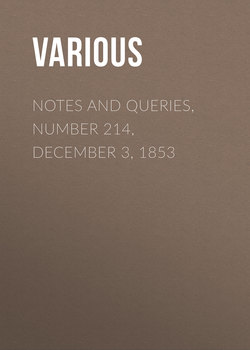Читать книгу Notes and Queries, Number 214, December 3, 1853 - Various - Страница 3
Notes
WOMEN AND TORTOISES
ОглавлениеI had intended sending you a paper on Bishop Taylor's Similes, with Illustrative Notes on some Passages in his Works; but I soon found that your utmost indulgence could not afford me a tithe of the space I would require. Instead, therefore, send you an illustration of a single simile, as it is short, and not the least curious in the lot:
"All vertuous women, like tortoises, carry their house on their heads, and their chappel in their heart, and their danger in their eye, and their souls in their hands, and God in all their actions."—Life of Christ, Part I. s. ii. 4.
"Phidias made the statue of Venus at Elis with one foot upon the shell of a tortoise, to signify two great duties of a virtuous woman, which are to keep home and be silent."—Human Prudence, by W. De Britaine, 12th edit.: Dublin, 1726, 12mo., p. 134.
"Vertuous women should keep house, and 'twas well performed and ordered by the Greeks:
' . . . mulier ne qua in publicum
Spectandam se sine arbitro præbeat viro:'
Which made Phidias, belike, at Elis paint Venus treading on a tortoise: a symbole of women's silence and housekeeping.... I know not what philosopher he was, that would have women come but thrice abroad all their time, to be baptized, married, and buried; but he was too straitlaced."—Burton's Anat. Mel., part iii. sec. 3. mem. 4. subs. 2.
"Apelles us'd to paint a good housewife upon a snayl; which intimated that she should be as slow from gadding abroad, and when she went she shold carry her house upon her back: that is, she shold make all sure at home. Now, to a good housewife, her house shold be as the sphere to a star (I do not mean a wandring star), wherin she shold twinckle as a star in its orb."—Howell's Parly of Beasts: Lond. 1660, p. 58.
The last passage reminds us of the fine lines of Donne (addressed to both sexes):
"Be then thine own home, and in thyself dwell;
Inn anywhere;
And seeing the snail, which everywhere doth roam,
Carrying his own home still, still is at home,
Follow (for he is easy-paced) this snail:
Be thine own palace, or the world's thy jail."
Eirionnach.
